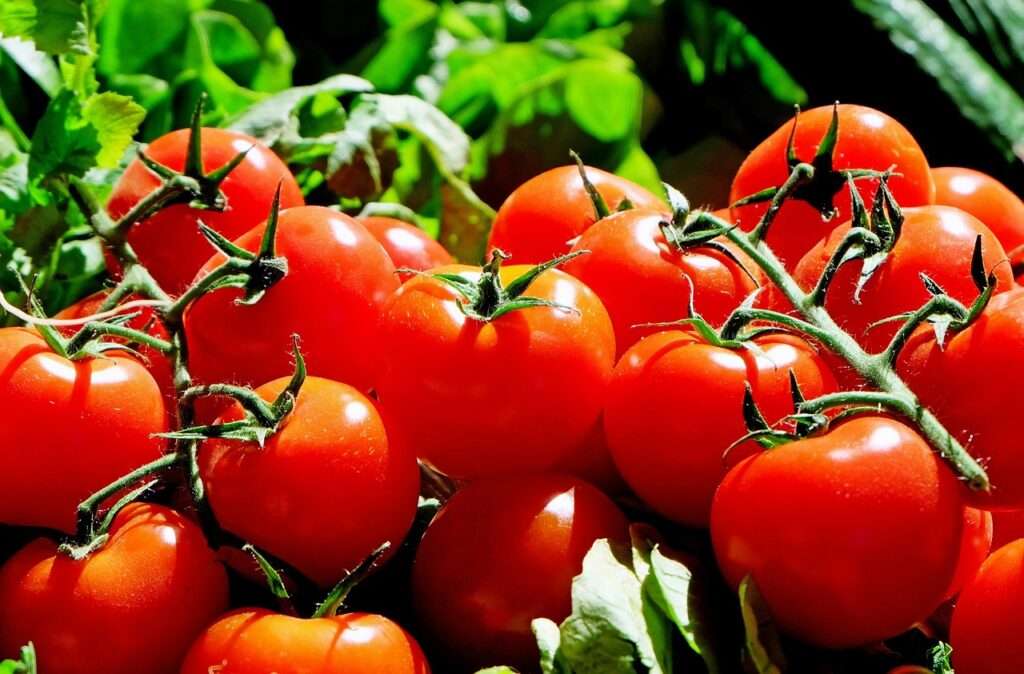Introduction
Are you seeking for a natural strategy to increase your weight reduction efforts? Look no further than the humble kale leaf! This nutrient-packed powerhouse has been making waves in the health community, and for good reason. Let’s dive into the world of kale and discover how this superfood can revolutionize your weight-loss journey. and let’s see the benefits of Kale.
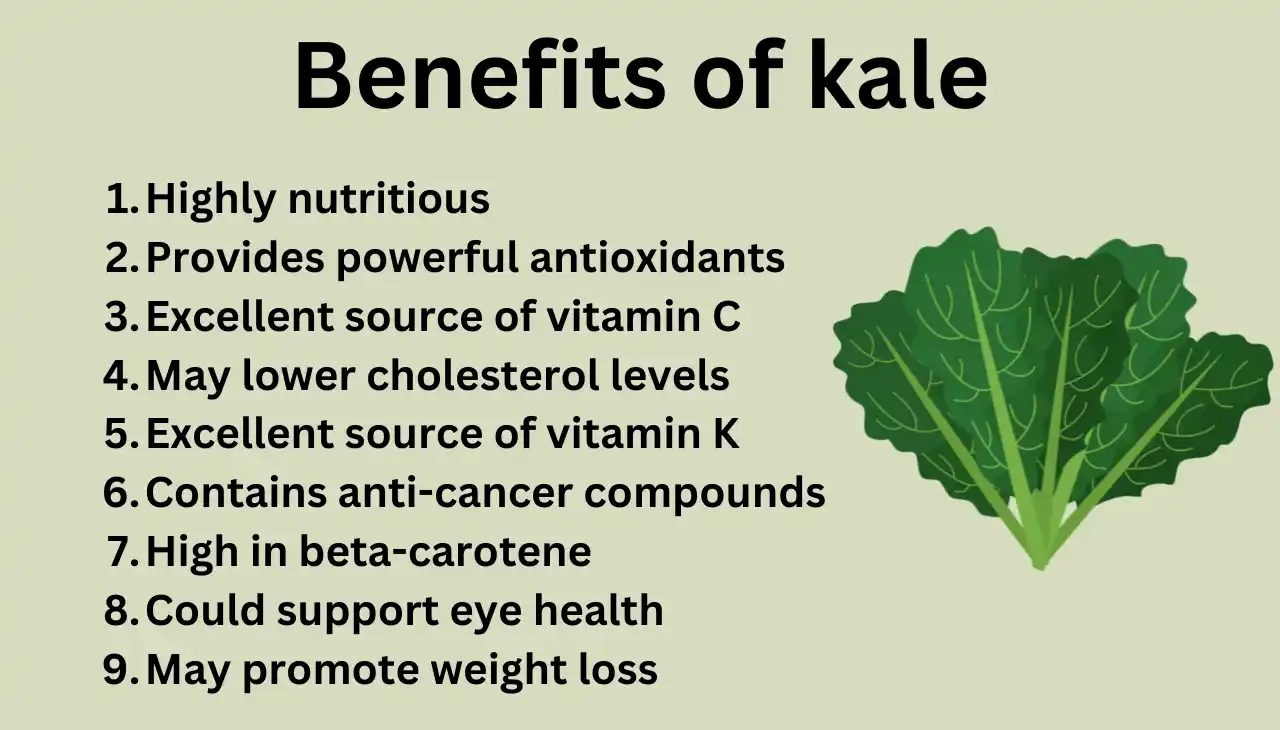
Benefits of kale for female
Kale is a powerhouse of nutrients and offers numerous health benefits, especially for women. Here are some key benefits:
- Rich in Nutrients: Kale is rich in vitamins A, C, and K, as well as minerals including calcium, potassium, and magnesium. These nutrients are essential for maintaining healthy skin, bones, and overall well-being.
- Supports Bone Health: The high calcium and vitamin K content in kale helps in maintaining strong bones and preventing osteoporosis.
- Boosts Immunity: Vitamin C in kale enhances the immune system, helping the body fight off infections and illnesses.
- Aids in Digestion: Kale is packed with fiber, which supports a healthy digestive system and helps keep your bowel movements regular.
- Heart Health: The antioxidants and potassium in kale support heart health by reducing blood pressure and lowering the risk of heart disease.
- Weight Management: Low in calories but high in fiber, kale can help in weight management by promoting a feeling of fullness and reducing overall calorie intake.
- Anti-Inflammatory Properties: Kale contains antioxidants like quercetin and kaempferol, which have anti-inflammatory effects and can help reduce chronic inflammation.
- Eye Health: The lutein and zeaxanthin in kale are beneficial for eye health and can help prevent age-related macular degeneration.
Incorporating kale into your diet can provide these benefits and contribute to overall health and well-being.
Top 10 health benefits of kale
Kale is a nutrient-dense, leafy green vegetable that has various health advantages. Here are the amazing top 10 health benefits of kale:
- Highly Nutritious: Kale is rich in vitamins A, C, and K, as well as minerals like calcium, potassium, and magnesium.
- Powerful Antioxidants: Kale contains antioxidants such as quercetin and kaempferol, which help combat oxidative stress and inflammation.
- Supports Heart Health: The potassium and antioxidants in kale can help lower blood pressure and reduce the risk of heart disease.
- Boosts Immunity: High in vitamin C, kale strengthens the immune system and helps the body fight off infections.
- Aids Digestion: Kale is high in fiber, promoting healthy digestion and regular bowel movements.
- Bone Health: The calcium and vitamin K in kale are essential for maintaining strong bones and preventing osteoporosis.
- Weight Management: Low in calories but high in fiber, kale can help with weight management by promoting a feeling of fullness.
- Eye Health: Kale contains lutein and zeaxanthin, which are beneficial for eye health and can help prevent age-related macular degeneration.
- Anti-Cancer Properties: The glucosinolates in kale have been linked to cancer prevention.
- Detoxification: Kale supports the body’s natural detoxification processes due to its high content of sulfur compounds.
Incorporating kale into your diet can provide these benefits and contribute to overall health and well-being.
Benefits of kale for skin
Kale is not only great for your overall health but also offers several benefits for your skin. Here are some key benefits:
- Rich in Antioxidants: Kale is packed with antioxidants like vitamins A, C, and E, which help protect your skin from free radical damage and environmental stressors.
- Brightens Skin: The high vitamin C content in kale can help brighten your skin and reduce the appearance of dark spots.
- Hydrates and Detoxifies: Kale’s vitamins and minerals help hydrate the skin and detoxify pores, making it beneficial for those with dehydrated or blemished skin.
- Reduces Fine Lines and Wrinkles: The antioxidants and vitamin K in kale can help reduce fine lines and wrinkles by promoting collagen production and increasing cell turnover.
- Anti-Inflammatory Properties: Kale’s anti-inflammatory properties can help soothe irritated and sensitive skin.
- Protects Against Sun Damage: The carotenoids in kale can help protect your skin from the damaging effects of the sun.
Incorporating kale into your diet and skincare routine can provide these benefits and help you achieve healthier, more radiant skin.
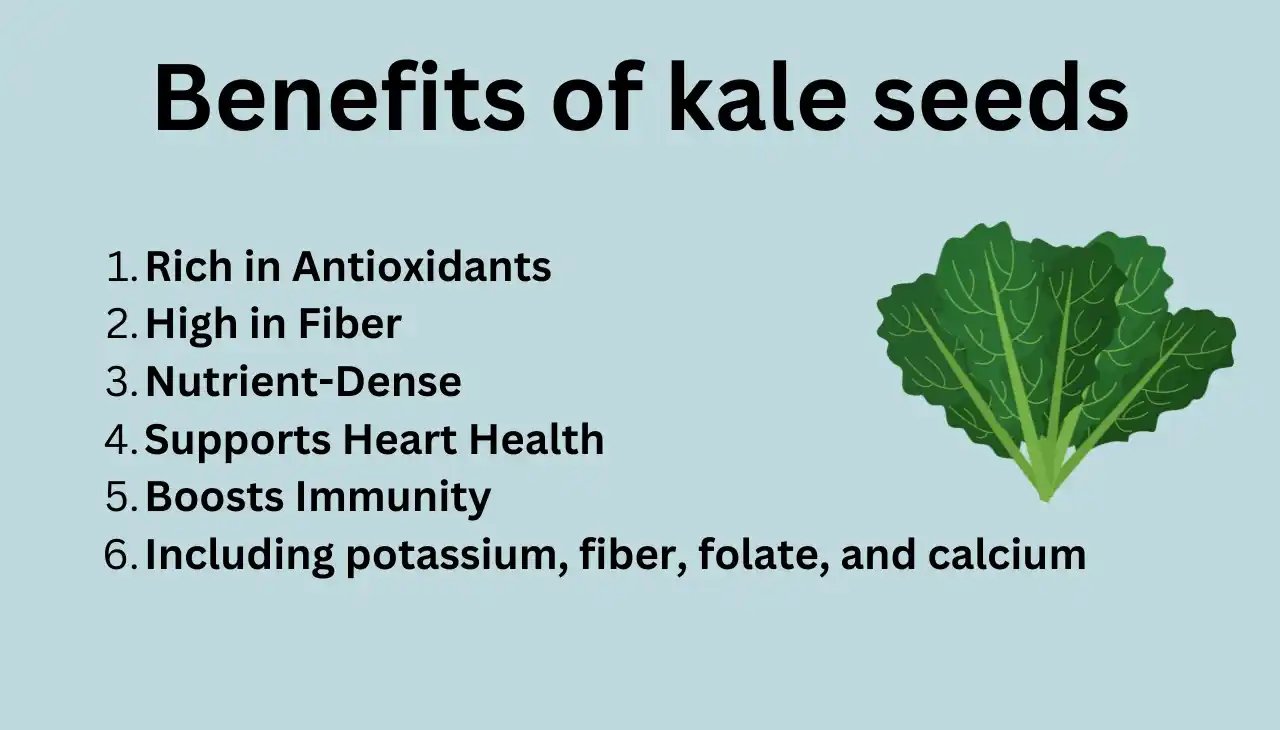
Benefits of kale for male
Kale offers numerous health benefits for men, making it a great addition to any diet. Here are some key benefits:
- Supports Heart Health: Kale is rich in potassium and antioxidants, which help lower blood pressure and reduce the risk of heart disease.
- Boosts Immunity: High in vitamin C, kale strengthens the immune system, helping the body fight off infections and illnesses.
- Enhances Muscle Function: The magnesium in kale is essential for muscle function and can help prevent cramps and muscle fatigue.
- Promotes Healthy Digestion: Kale is high in fiber, which aids in digestion and promotes regular bowel movements.
- Aids in Weight Management: Low in calories but high in fiber, kale can help with weight management by promoting a feeling of fullness.
- Supports Bone Health: The calcium and vitamin K in kale are crucial for maintaining strong bones and preventing osteoporosis.
- Improves Eye Health: Kale contains lutein and zeaxanthin, which are beneficial for eye health and can help prevent age-related macular degeneration.
- Detoxifies the Body: The sulfur compounds in kale support the body’s natural detoxification processes.
- Reduces Inflammation: Kale’s anti-inflammatory properties can help reduce chronic inflammation, which is linked to various health issues.
- Boosts Energy Levels: The iron and B vitamins in kale help increase energy levels and combat fatigue.
Incorporating kale into your diet can provide these benefits and contribute to overall health and well-being.
Benefits of kale seeds
Kale seeds, like the leaves, are packed with nutrients and offer several health benefits. Here are some key benefits of kale seeds:
- Rich in Nutrients: Kale seeds contain essential vitamins and minerals, including vitamins A, C, and K, as well as calcium, potassium, and magnesium.
- High in Antioxidants: They are a good source of antioxidants, which help protect the body from oxidative stress and inflammation.
- Supports Heart Health: The nutrients in kale seeds can help lower blood pressure and reduce the risk of heart disease.
- Boosts Immunity: The vitamin C content in kale seeds helps strengthen the immune system.
- Aids Digestion: Kale seeds are high in fiber, which promotes healthy digestion and regular bowel movements.
- Bone Health: The calcium and vitamin K in kale seeds are essential for maintaining strong bones and preventing osteoporosis.
- Weight Management: Low in calories but high in fiber, kale seeds can help with weight management by promoting a feeling of fullness.
- Improves Eye Health: The lutein and zeaxanthin in kale seeds are beneficial for eye health and can help prevent age-related macular degeneration.
- Detoxification: Kale seeds support the body’s natural detoxification processes due to their high content of sulfur compounds.
- Anti-Inflammatory Properties: The anti-inflammatory properties of kale seeds can help reduce chronic inflammation.
Incorporating kale seeds into your diet can provide these benefits and contribute to overall health and well-being.
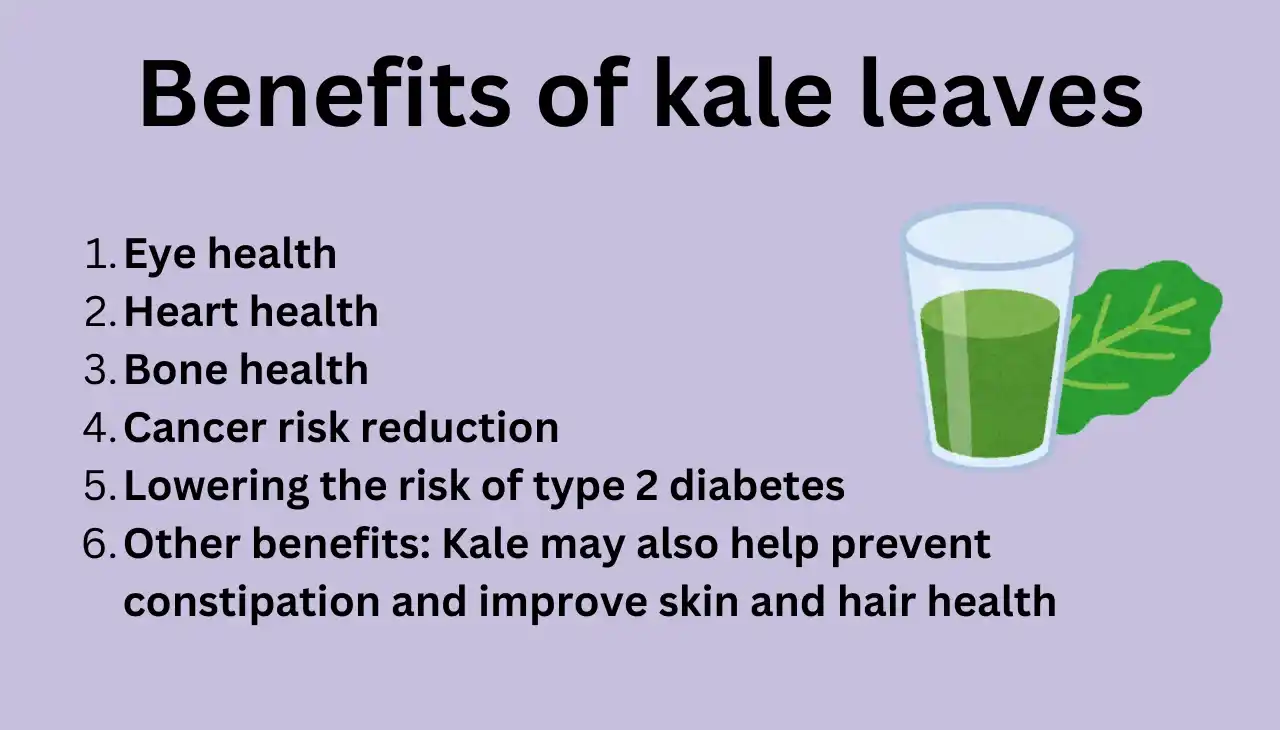
Benefits of kale leaves
Kale leaves are incredibly nutritious and offer a wide range of health benefits.
- Nutrient-Dense: Kale seeds contain essential vitamins and minerals, including vitamins A, C, and K, as well as calcium, potassium, and magnesium.
- Powerful Antioxidants: Kale contains antioxidants such as quercetin and kaempferol, which help combat oxidative stress and inflammation.
- Supports Heart Health: The potassium and antioxidants in kale can help lower blood pressure and reduce the risk of heart disease.
- Boosts Immunity: High in vitamin C, kale strengthens the immune system and helps the body fight off infections.
- Aids Digestion: Kale is high in fiber, promoting healthy digestion and regular bowel movements.
- Bone Health: The calcium and vitamin K in kale are essential for maintaining strong bones and preventing osteoporosis.
- Weight Management: Low in calories but high in fiber, kale can help with weight management by promoting a feeling of fullness.
- Eye Health: Kale contains lutein and zeaxanthin, which are beneficial for eye health and can help prevent age-related macular degeneration.
- Anti-Cancer Properties: The glucosinolates in kale have been linked to cancer prevention.
- Detoxification: Kale supports the body’s natural detoxification processes due to its high content of sulfur compounds.
Incorporating kale leaves into your diet can provide these benefits and contribute to overall health and well-being.
Benefits of kale smoothie
Kale smoothies are a fantastic way to incorporate the numerous health benefits of kale into your diet. Here are some key benefits:
- Nutrient-Rich: Kale smoothies are packed with vitamins A, C, and K, as well as minerals like calcium, potassium, and magnesium.
- Boosts Immunity: The high vitamin C content in kale helps strengthen the immune system, making you more resistant to infections.
- Supports Heart Health: The antioxidants and potassium in kale can help lower blood pressure and reduce the risk of heart disease.
- Aids Digestion: Kale is high in fiber, which promotes healthy digestion and regular bowel movements.
- Detoxifies the Body: Kale contains sulfur compounds that support the body’s natural detoxification processes.
- Promotes Healthy Skin: The antioxidants in kale help protect your skin from damage and can improve skin tone and texture.
- Weight Management: Low in calories but high in fiber, kale smoothies can help you feel full and satisfied, aiding in weight management.
- Anti-Inflammatory Properties: Kale’s anti-inflammatory properties can help reduce chronic inflammation, which is linked to various health issues.
- Bone Health: The calcium and vitamin K in kale are essential for maintaining strong bones and preventing osteoporosis.
- Energy Boost: The iron and B vitamins in kale help increase energy levels and combat fatigue.
Incorporating kale smoothies into your diet can provide these benefits and contribute to overall health and well-being.
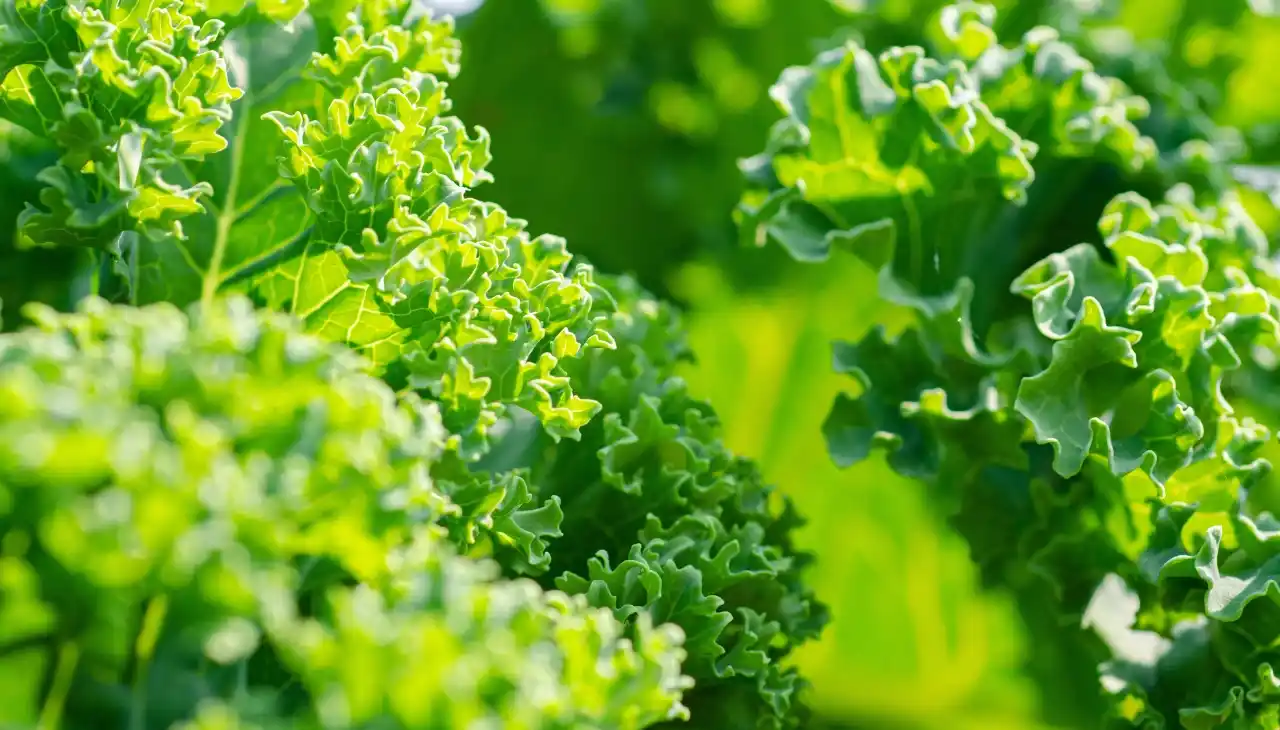
Benefits of kale for weight loss
Kale’s Role in Weight Loss
- Kale is a superfood with a rich array of nutrients that support weight loss.
- Each leaf contains Vitamin C, Vitamin K, Beta-carotene, and antioxidants.
- These nutrients help prevent the consumption of empty-calorie snacks that can derail weight loss progress.
- Kale is the heavyweight champion in terms of nutritional density, offering more vitamins and minerals per bite than spinach or lettuce.
- Kale’s nutritional density is comparable to a sports car, providing more oomph than a regular car.
Kale’s Low-Calorie, High-Volume Secret Weapon for Weight Loss
- Kale’s low calorie content and high volume make it ideal for weight loss.
- A whole cup of kale contains only 7.35 calories, making it a calorie deficit-friendly food.
- Kale’s high water content provides a satisfying fill-up without adding extra calories, promoting fullness and satisfaction.
Fiber: The Unsung Hero in Weight Loss
- Kale contains about 3% fiber by weight, acting as a digestive broom.
- Fiber acts as a hunger suppressant, slowing down digestion and making you feel fuller for longer.
- Kale salads can resist mid-afternoon snack attacks, enhancing overall weight loss.
“Antioxidants: Weight Loss Boost“
- Discusses the connection between antioxidants and weight loss.
- Highlights the role of kale’s antioxidants, like glucosinolates, in combating inflammation.
- Highlights the inflammation-weight connection, highlighting how chronic inflammation can hinder weight regulation.
- Suggests reducing inflammation in kale can enhance weight loss efforts.
Kale’s Cardiovascular Credentials for Weight Loss
- Rich in potassium, manganese a natural blood pressure regulator.
- Compounds can lower cholesterol.
- Supports heart health while shedding pounds.
The Cancer-Fighting Bonus: Long-Term Health While You Slim Down
Here’s where kale really shows off. It contains compounds like sulforaphane and indole-3-carbinol that have shown promise in cancer prevention research. So while you’re focused on your weight loss goals, kale is thinking long-term, potentially helping to reduce your cancer risk.
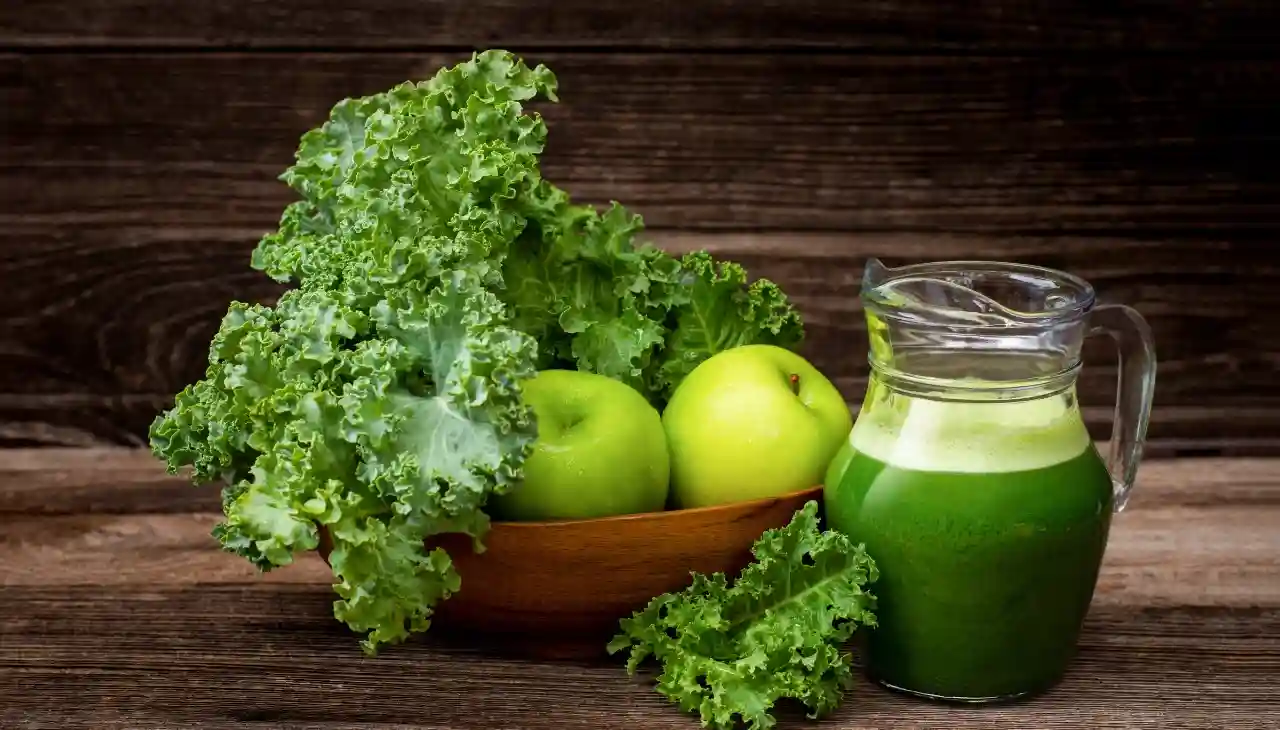
Kale in the Kitchen: Delicious Greens Consumption
- Introducing kale salads: transforming kale leaves into tender, delicious base for salad toppings.
- Kale in smoothies: Adding kale to morning smoothies to mask the taste of sweet fruits.
- Kale is like sneaking veggies into a kid’s meal, providing all the benefits.
Kale Juice: The Green Elixir of Weight Loss
- Juicing kale distills all its goodness into one potent nutrition shot.
- Juice vs. Whole Leaf Debate: Juicing kale concentrates nutrients, but loses fiber.
- Balance: Enjoy whole kale some days and juice on others.
Practical Tips for Kale-Powered Weight Loss
- Start small: Add a handful of kale to your usual meals.
- Experiment with recipes: Don’t get stuck in a rut. Try kale chips, kale pesto, or even kale pizza crust!
- Pair with protein: Combine kale with lean proteins for a satisfying, balanced meal.
- Listen to your body: While kale is nutritious, it’s high in fiber. Ease it slowly to prevent any digestive unease.
Real-Life Kale Success Stories
Still not convinced? Let me share a couple of real-life success stories:
Sarah, 34, lost 20 pounds in 3 months after incorporating kale into her daily diet. “I replaced my customary mid-afternoon chips with kale chips, and the pounds immediately started melting away!”
Mike, 42, lowered his cholesterol and lost 15 pounds by starting each day with a kale smoothie. “I never thought I’d be someone who enjoys green smoothies, but now I can’t imagine starting my day without one!”
Side effects of kale
While kale is highly nutritious, it can have some side effects, especially if consumed in large quantities.
- Digestive Issues: Kale is high in fiber, which can cause gas, bloating, and digestive discomfort, particularly for those not used to high-fiber diets.
- Interference with Thyroid Function: Kale contains goitrogens, which can interfere with thyroid function if consumed in excessive amounts. For those with thyroid conditions, this information is especially important.
- Interaction with Blood Thinners: Kale is rich in vitamin K, which plays a role in blood clotting. This can interfere with blood-thinning medications like warfarin (Coumadin).
- Heavy Metal Contamination: Kale can absorb heavy metals like thallium from the soil, which can be harmful in large amounts.
- Oxalates: Kale contains oxalic acid, which can affect calcium absorption and may contribute to kidney stones in susceptible individuals.
To minimize these side effects, it’s best to consume kale in moderation and ensure a balanced diet. Cooking kale can also reduce some of its goitrogenic properties and make it easier to digest.
Conclusion
Kale, a trendy superfood, is a powerful tool for weight loss. Its low-calorie content, fiber, antioxidants, and heart-healthy nutrients provide support from multiple angles. However, kale is not a magic bullet for weight loss; it works best with a balanced diet and active lifestyle. To join the kale revolution, start small, get creative, and have fun with it. Your body will appreciate the benefits of kale, and your health and weight loss journey will be a rewarding experience.
FAQs
How much kale should I eat per day for weight loss?
While there's no one-size-fits-all answer, incorporating 1-2 cups of kale into your daily diet can be beneficial for weight loss. Begin with modest quantities and gradually increase to minimize gastric discomfort. Remember, kale should be part of a balanced diet, not the only focus. The key is consistency and combining kale consumption with overall healthy eating habits and regular exercise.
Can eating too much kale be harmful?
While kale is incredibly nutritious, it is possible to overdo it. Eating excessive amounts of kale may lead to: 1)Digestive issues due to its high fiber content, 2)Interference with thyroid function, especially in people with existing thyroid problems, 3)Potential interaction Because of its high vitamin K concentration, it is used in conjunction with blood thinners. Moderation is key. For most people, eating a few servings of kale per week is perfectly safe and beneficial.
I don't like the taste of raw kale. Are there other ways to prepare it that might be more palatable?
Absolutely! If you're not a fan of raw kale, try these preparation methods: 1)Sautéing: Lightly cook kale with garlic and olive oil for a softer texture and milder flavor, 2)Baking: Make crispy kale chips seasoned with your favorite spices, 3)Blending: Add kale to smoothies with sweet fruits to mask the taste, 4)Steaming: Briefly steam kale to soften it, then dress with lemon juice and a touch of salt, 5)Massaging: For salads, massage raw kale with lemon juice and olive oil to break down the tough fibers and improve texture. Experiment with different approaches to see what works best for your tastes!
Is kale better for weight loss than other leafy greens like spinach?
While kale is often touted as a superfood, it's not necessarily "better" than other leafy greens for weight loss. Each green has its own unique nutritional profile: Kale is particularly high in vitamin K, C, and antioxidants, Spinach is richer in iron and folate, Swiss chard has more magnesium. For weight loss, the best approach is to include a variety of leafy greens in your diet. This ensures you get a wide range of nutrients while keeping your meals interesting and enjoyable. The key is finding greens you enjoy eating regularly, whether that's kale, spinach, or a mix of different leafy vegetables.
Can kale help reduce belly fat specifically?
While no single food can target fat loss in a specific area of the body (spot reduction is a myth), kale can contribute to overall fat loss, including belly fat. Here's how kale can help: 1) Low in calories: Helps create a calorie deficit necessary for weight loss, 2) High in fiber: Promotes feelings of fullness, potentially reducing overall calorie intake, 3) Rich in nutrients: Supports overall health and efficient bodily functions, 4) Anti-inflammatory properties: May help reduce bloating and support a healthy metabolism. Remember, sustainable weight loss, including reduction in belly fat, comes from a combination of a nutritious diet, regular physical activity, adequate sleep, and stress management. Kale can be a valuable part of this holistic approach to weight loss and health.



